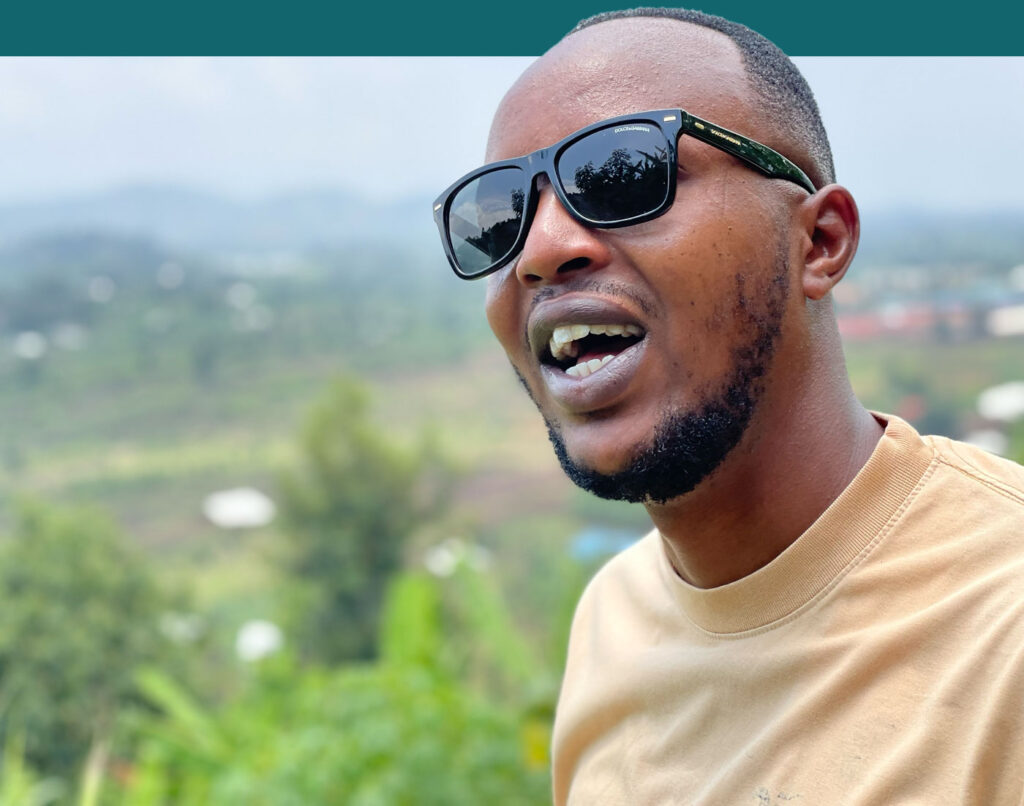Journey with me through Rwanda – a land where nature paints perpetual spring scenes and history whispers tales of resilience and remembrance. From the serene gardens of the Kigali Genocide Memorial to the hidden treasures of the Burera district, Rwanda’s beauty and history captivate the soul. Explore lush landscapes, tranquil lakes, and majestic volcanoes, guided by Christian’s expertise. Discover the Ellen DeGeneres Campus of the Dian Fossey Gorilla Fund, a beacon of hope for endangered mountain gorillas.
Join me on this condensed voyage through Rwanda – a tapestry woven with tales of nature’s beauty, human resilience, and enduring hope.
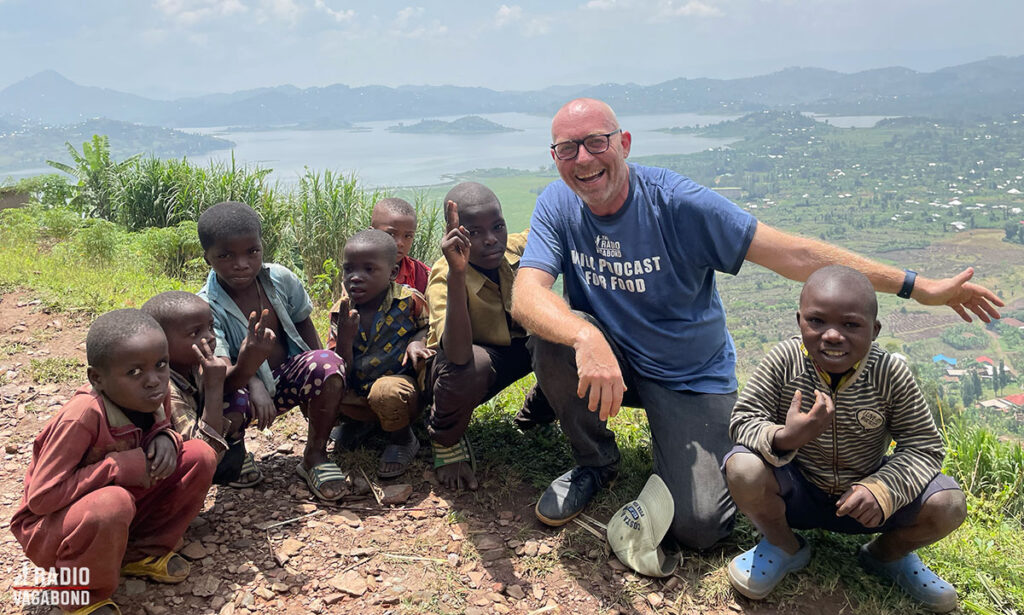
The Weather
Rwanda, known as the land of eternal spring, is a captivating tapestry of weather phenomena that captivates the senses and enchants the soul. Join me as we embark on a sensory journey through Rwanda’s climate – a symphony of gentle breezes, invigorating showers, and radiant sunshine that paints the landscape in hues of natural wonder.
Throughout the year, Rwanda boasts a climate that strikes a delicate balance between coolness and warmth, owing to its elevated altitude. Yet don’t be fooled by the term “cool” – Rwanda’s atmosphere is infused with a comforting warmth and an abundance of sunshine that bathes the land in a perpetual glow. Imagine lush greenery stretching as far as the eye can see, punctuated by bursts of vibrant flowers and the occasional sighting of a rainbow arching gracefully across the sky. It’s as if Mother Nature herself has meticulously crafted a canvas of perpetual springtime, inviting us to immerse ourselves in its splendour.
Now, let’s delve into the realm of rainfall. Rwanda experiences two distinct rainy seasons, from March to May and October to November, where the heavens open up to nourish the earth below. While some may view these months as a challenge, for me, there’s an undeniable magic in the rhythmic patter of raindrops dancing on rooftops, infusing the air with a sense of renewal and vitality. These showers breathe life into the land, transforming it into a lush oasis teeming with vibrant foliage and thriving ecosystems. But fear not, sun-seekers, for Rwanda has much to offer during its drier months. From June to September, the country undergoes a remarkable transformation, emerging as a paradise for those craving the warm embrace of the sun.
With clear skies and temperatures ranging from a comfortable 18-26°C (64-79°F), it’s the ideal time to venture into the great outdoors and explore Rwanda’s breath-taking landscapes. Whether you’re embarking on a trek through dense forests in search of elusive gorillas or simply soaking in the panoramic views of Rwanda’s iconic thousand hills, the weather sets the stage for an unforgettable adventure.
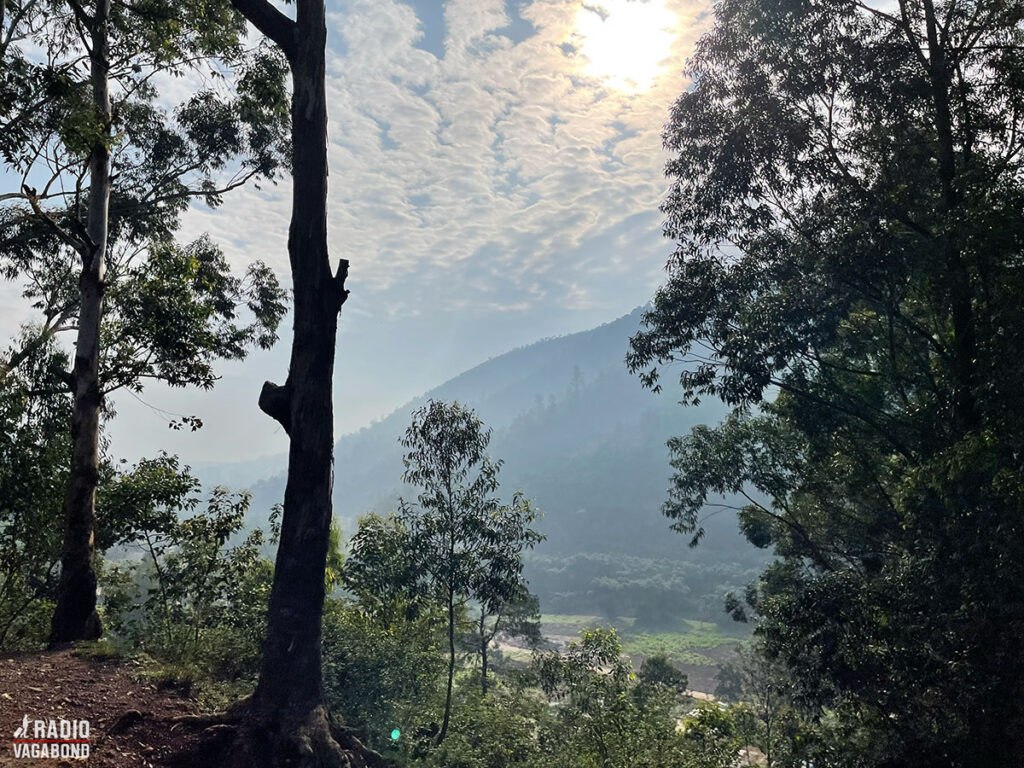
The Kigali Genocide Memorial
As I stepped through the gates of the Kigali Genocide Memorial, I knew I was about to embark on a journey that would leave a lasting impact on me. The warm sun cast its golden glow over the courtyard as I joined the tour, ready to immerse myself in the solemn atmosphere of remembrance. Instead of joining the group, I opted for an audio guide, slipping on the headset as I prepared to delve into the heart-wrenching history contained within these walls.
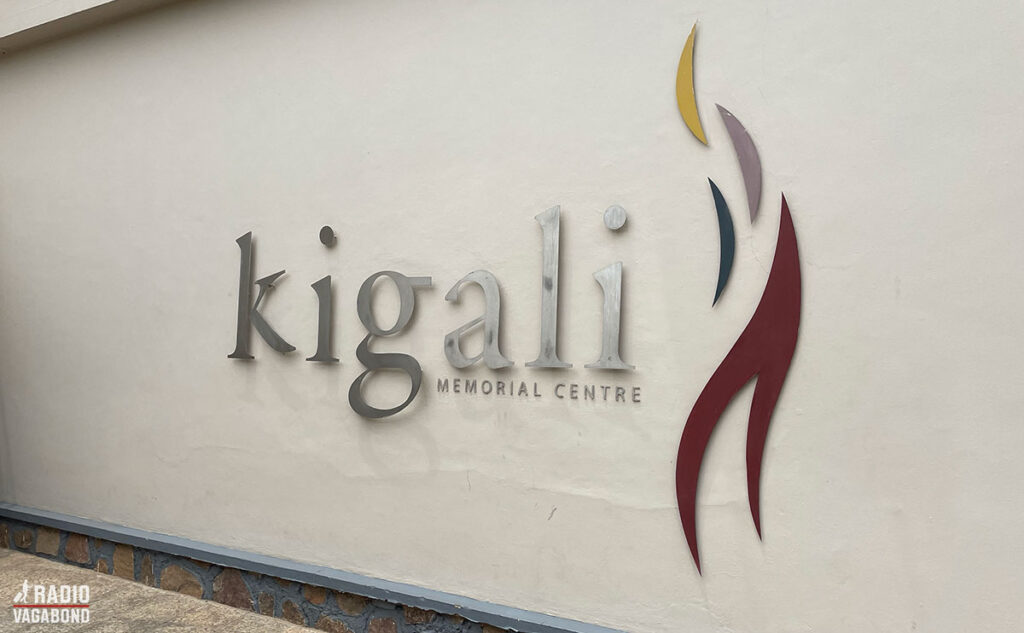
The first stop on my audio tour led me outside, where I was confronted with the sight of mass graves stretching out before me. It was a sombre moment, as I stood in silence, surrounded by the resting places of over a quarter of a million souls. The sheer magnitude of the tragedy weighed heavily on my heart, and I couldn’t help but feel overwhelmed by the enormity of it all. The gardens surrounding the graves provided a small semblance of peace, offering a tranquil space for reflection amidst the chaos of history.
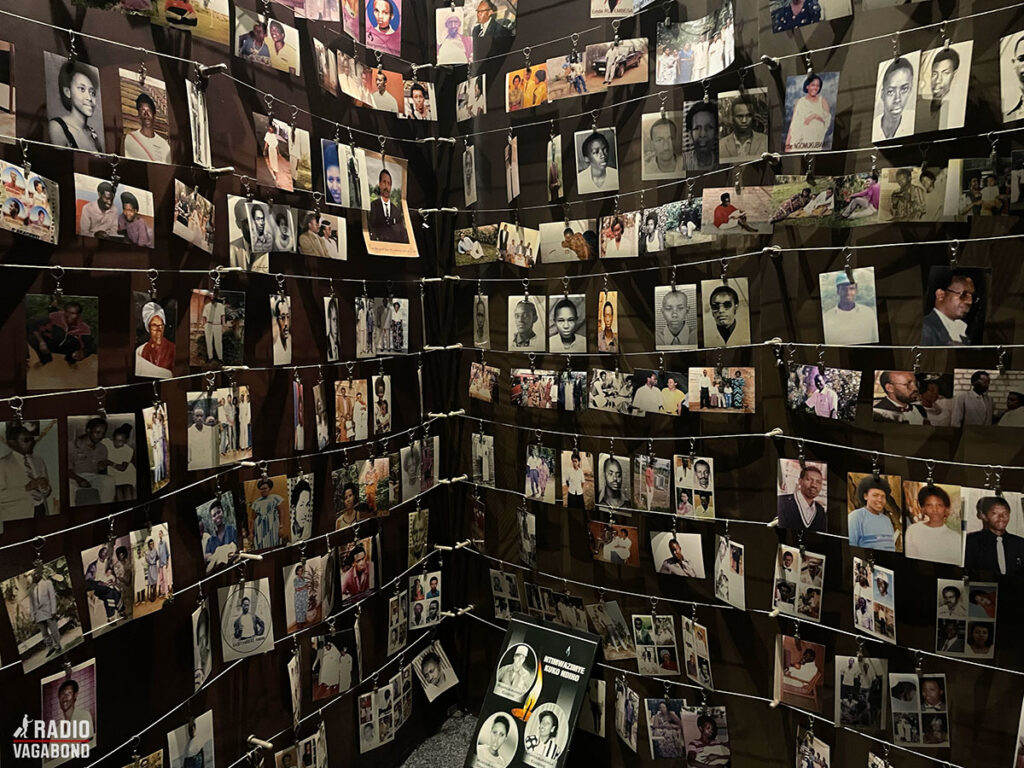
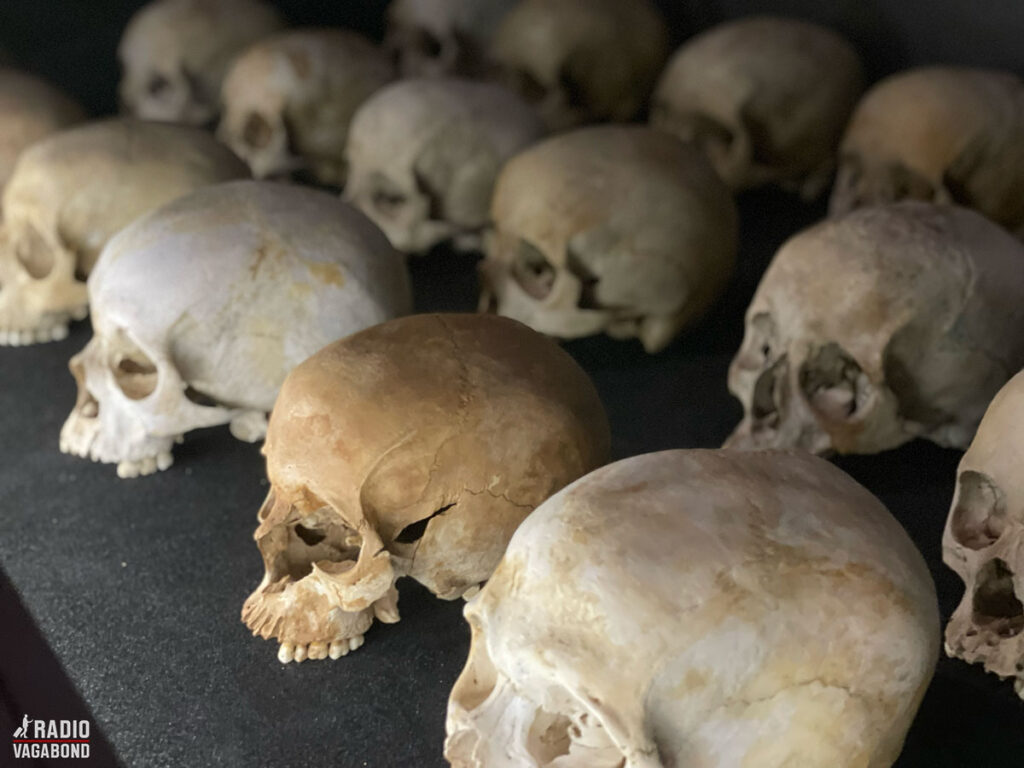
As I walked amongst the flowers and trees, I found solace in the quiet beauty of the surroundings, allowing myself a moment to process the emotions that threatened to overwhelm me. Pausing my audio guide, I took a moment to simply be present in this place of remembrance, allowing the gravity of the situation to wash over me. It was a time for quiet contemplation, a chance to honour the memories of those who had been lost in the tragedy of genocide. And as I stood there, surrounded by the echoes of history, I couldn’t help but feel a profound sense of gratitude for the opportunity to bear witness to this important chapter in Rwanda’s past. It was a reminder of the resilience of the human spirit, and the importance of never forgetting the lessons of the past.
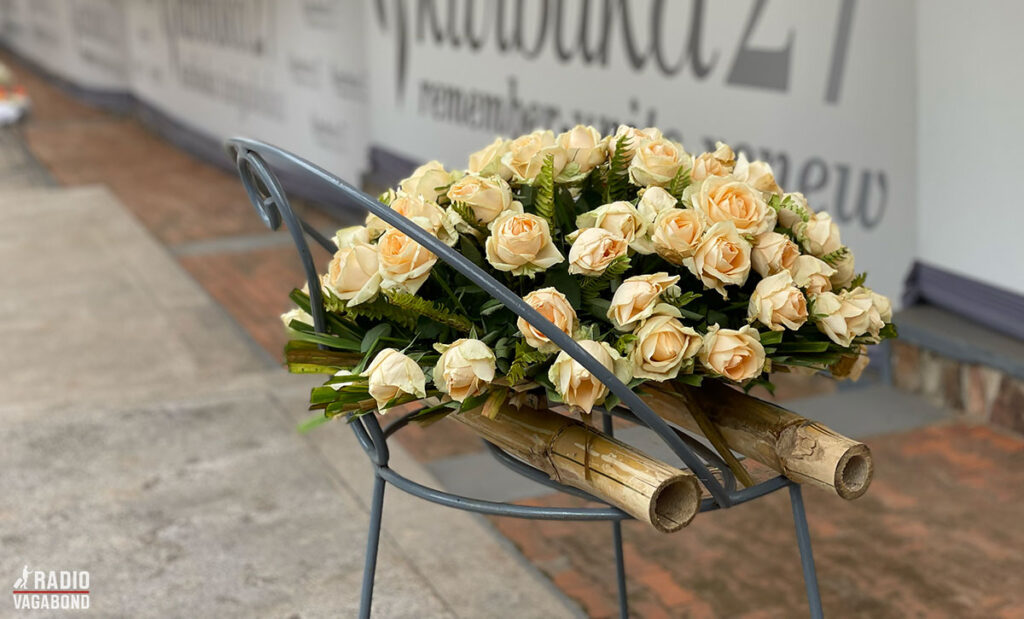
WHO ARE YOU?
Please spend five minutes taking a the survey – tell me a bit about who you are and what you would like more or less on here on The Radio Vagabond.
RWANDA GENOCIDE IN 1994
The 1994 genocide in Rwanda stands as one of the darkest chapters in human history, where approximately 800,000 to 1 million lives were tragically lost in just 100 days. This brutal clash was ignited by deep-rooted ethnic tensions, exacerbated during the colonial era when the Belgians favoured the Tutsi minority, intensifying the division between Hutus and Tutsis. The rift was further solidified through the implementation of identity cards, which categorised individuals by ethnicity. The spark that ignited the genocide occurred on April 6, 1994, when the President’s plane was shot down. The identity of those responsible for this act remains a matter of debate and investigation.
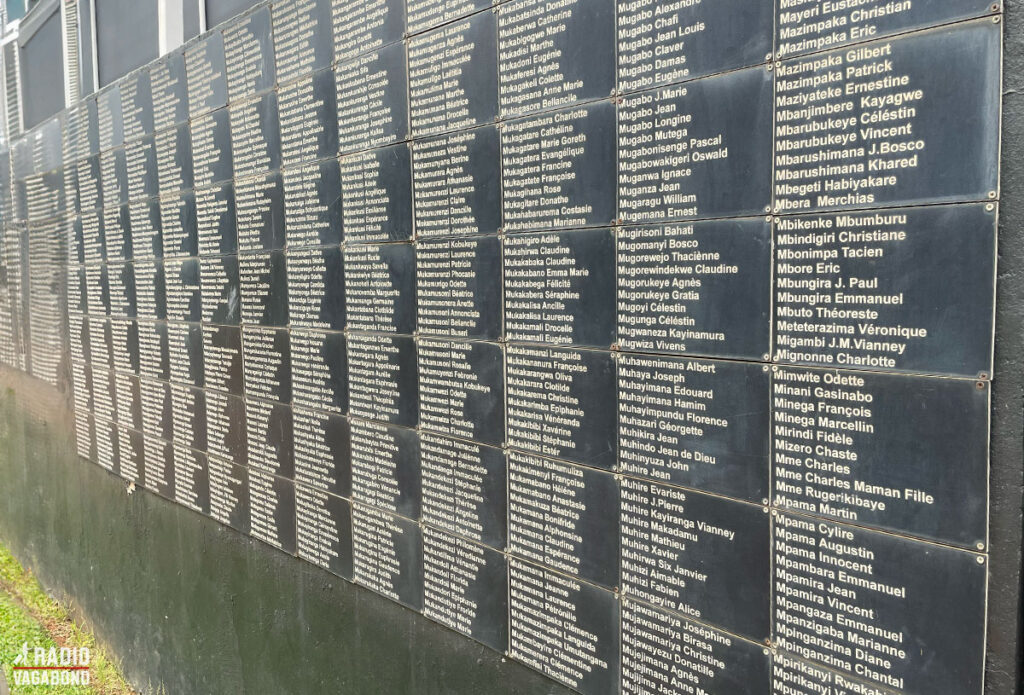
Nevertheless, it served as the catalyst for a horrific wave of violence, predominantly perpetrated by Hutu extremists against Tutsis and moderate Hutus. The brutality was chillingly intimate, with neighbours, friends, and even family members turning on each other, wielding machetes in acts of unspeakable violence. Shockingly, the world’s response to this humanitarian crisis was woefully inadequate. Despite the presence of UN peacekeepers on the ground, the international community failed to intervene effectively, leaving the targeted population defenceless. The genocide finally came to a halt in July 1994 when the Rwandan Patriotic Front (RPF), led by Tutsis, seized control of the country. However, the aftermath was a landscape of devastation. Rwandan society lay in ruins, countless people displaced from their homes, and the economy in shambles.
The daunting task of rebuilding the nation lay ahead. The RPF played a pivotal role in ending the genocide by taking military action against the genocidal regime. Following the genocide, they assumed governance and played a crucial role in Rwanda’s recovery and governance. The Genocide Memorial stands as a solemn testament to the lives lost during those horrific days. Stepping into the memorial, one is enveloped in a sombre silence, a poignant reminder of the atrocities committed. The exhibitions meticulously chronicle the events leading up to the genocide, the harrowing days of the massacre, and the painful aftermath. Personal stories, conveyed through photographs, belongings, and survivor testimonies, serve as poignant reminders of the human cost of hatred and division. One such survivor, Stephan, shares the harrowing tale of returning to Rwanda with his family, only to uncover the horrifying extent of the tragedy. His mother, one of fifteen children, bore witness to unimaginable loss and suffering.
The memorial’s dedication to the child victims of the genocide is particularly poignant. Details of their lives, from favourite foods to cherished friends, alongside accounts of their untimely deaths, serve as a stark reminder of the innocence extinguished by hatred and violence. Rwanda’s journey of healing and reconciliation has been arduous. Despite the immense challenges, the nation has made remarkable strides towards unity and peace. The Kigali Genocide Memorial serves not only as a site of remembrance but also as a beacon of education, reminding us of the importance of collective memory in preventing future atrocities.
Visiting the memorial is a sobering experience, challenging visitors to confront the darkest aspects of humanity while also inspiring reflection on the power of resilience and hope. It is a powerful reminder that the lessons of history must never be forgotten, and that each of us has a role to play in creating a world where such horrors are never repeated.
See more about how the Rwandan genocide could happen in this video from BBC Africa.
HIKE IN THE THOUSAND HILLS
As the sun began its ascent over the horizon, I found myself embarking on a journey through the picturesque landscapes of Rwanda’s famed “Land of a Thousand Hills.” Accompanied by our knowledgeable guide, Christian, and a small group of fellow adventurers, we set out on a quest to explore the hidden gems nestled near the border of Uganda. Our destination? The Burera district, home to the captivating Twin Lakes of Burera and Ruhondo.
With anticipation coursing through my veins, I eagerly awaited the wonders that awaited us. As we traversed the winding roads, Christian regaled us with tales of the region’s rich history and natural splendour. He spoke of the Twin Lakes, each boasting its own unique charm and allure. Burera, with its five islands, stood as a testament to Rwanda’s breath-taking beauty, while Ruhondo beckoned with its serene waters and tranquil atmosphere. Upon our arrival, we were greeted by the lush greenery of the surrounding banana plantations, a testament to Rwanda’s fertile soil and abundant resources. With Christian leading the way, we ventured deeper into the heart of this verdant paradise, eager to uncover its secrets. As we ascended the rugged terrain, Christian shared fascinating anecdotes about the islands that dotted the lakeshores.
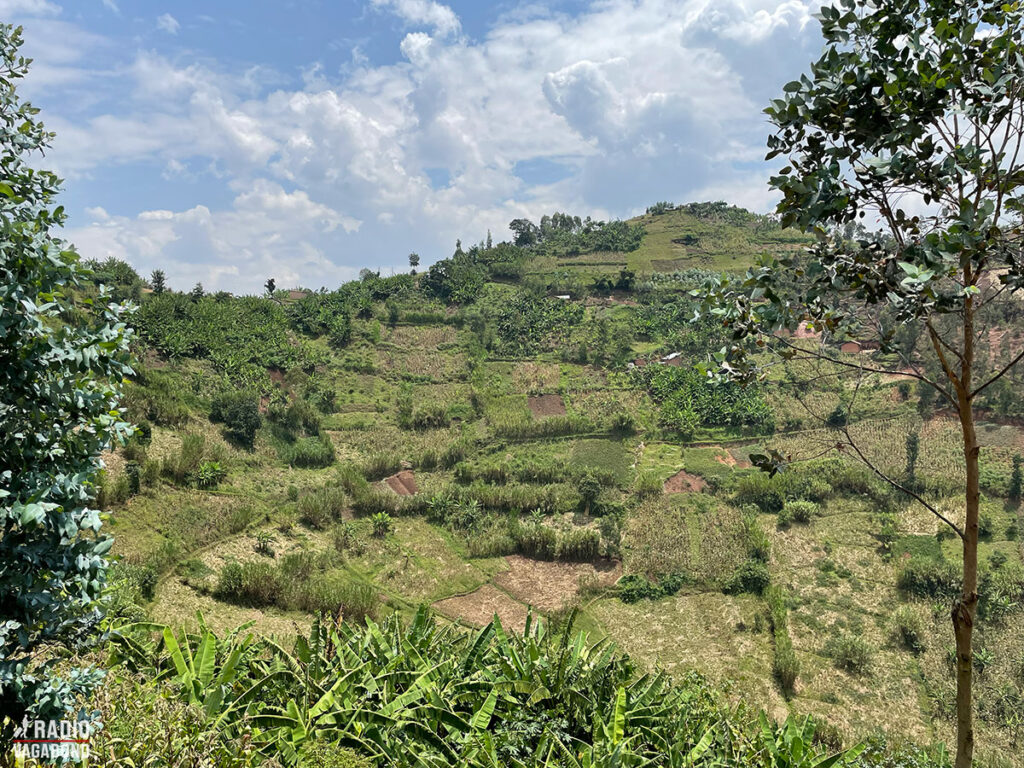
He spoke of their significance to the local community and the resilience of the people who called them home. With each step, we drew closer to our destination – the summit overlooking Lake Burera, where panoramic views of the surrounding landscape awaited us. As we reached the pinnacle, a sense of awe washed over me, as I beheld the majesty of the landscape spread out before me. From our vantage point, we could see the towering peaks of five volcanoes, their majestic silhouettes etched against the sky. Below, the Twin Lakes shimmered like jewels, their waters reflecting the golden hues of the rising sun. As I stood there, enveloped in the beauty of the moment, I couldn’t help but marvel at the sheer magnificence of Rwanda’s natural wonders.
And as Christian shared tales of past adventures and unforgettable sunsets, I felt a profound sense of gratitude for the opportunity to explore this enchanting land. As we made our descent, I knew that this journey would forever hold a special place in my heart. For in the hills of Rwanda, amidst the beauty of nature’s embrace, I had discovered a sense of wonder and awe that would stay with me long after the journey had ended.
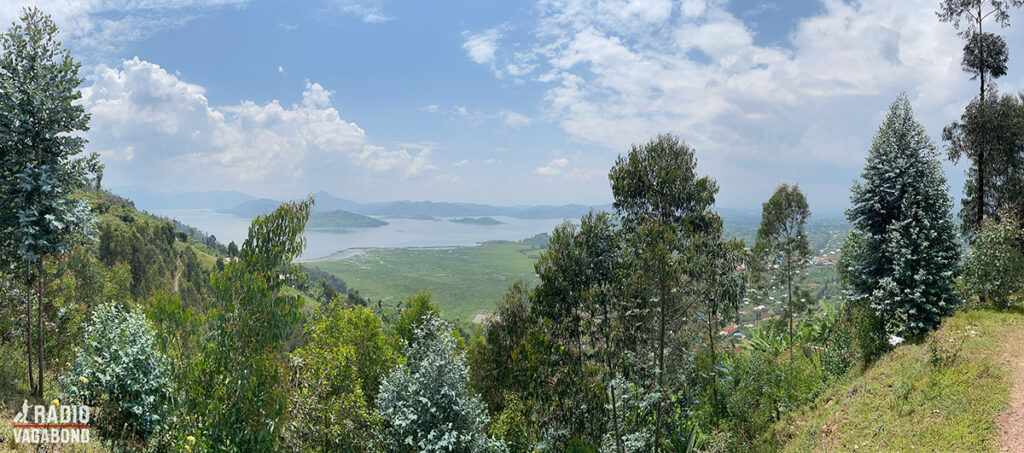
Ellen Degeneres Campus of the Dian Fossey Gorilla Fund
Nestled within Rwanda’s lush landscapes lies a beacon of hope for the endangered mountain gorillas – the Ellen DeGeneres Campus of the Dian Fossey Gorilla Fund. This remarkable institution, named after the iconic comedian and animal rights advocate Ellen DeGeneres, serves as a testament to her unwavering commitment to wildlife conservation and her desire to make a positive impact on our planet.
The roots of this noble cause stretch back to 1967 when the renowned primatologist Dr. Dian Fossey founded the Dian Fossey Gorilla Fund. For over five decades, this organisation has been at the forefront of gorilla conservation, dedicating itself to protecting these magnificent creatures and deepening our understanding of their complex social structures and behaviours.
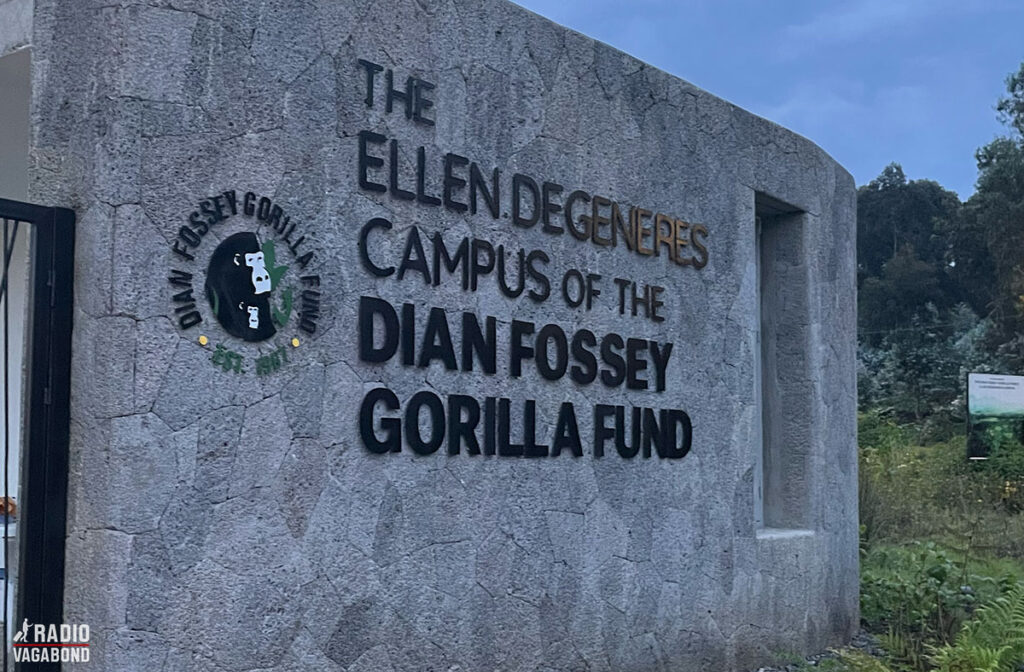
At the Ellen DeGeneres Campus, a diverse array of researchers, conservationists, and volunteers from around the globe converge to collaborate on projects aimed at safeguarding the future of mountain gorillas. From meticulously tracking gorilla populations to studying their habitats in depth, every effort is made to ensure the long-term survival of these majestic animals. One of the most remarkable aspects of the Ellen DeGeneres Campus is the palpable sense of dedication and passion exhibited by everyone involved in this noble cause. Whether it’s the intrepid field researchers trekking through dense forests, or the local communities actively engaged in conservation education initiatives, each individual plays a vital role in the ongoing efforts to protect the mountain gorillas and their habitat. During my visit to the Ellen DeGeneres Campus, I was struck by the scale of the operation and the level of commitment displayed by its staff and volunteers.
Witnessing first-hand the tireless efforts being made to protect these endangered primates was both inspiring and humbling. Through initiatives like the Ellen DeGeneres Campus and the Dian Fossey Gorilla Fund, we have the power to make a real difference in the world – one gorilla, one habitat, at a time. It is a reminder of the importance of collective action in preserving our planet’s biodiversity and ensuring a brighter future for all species, great and small.
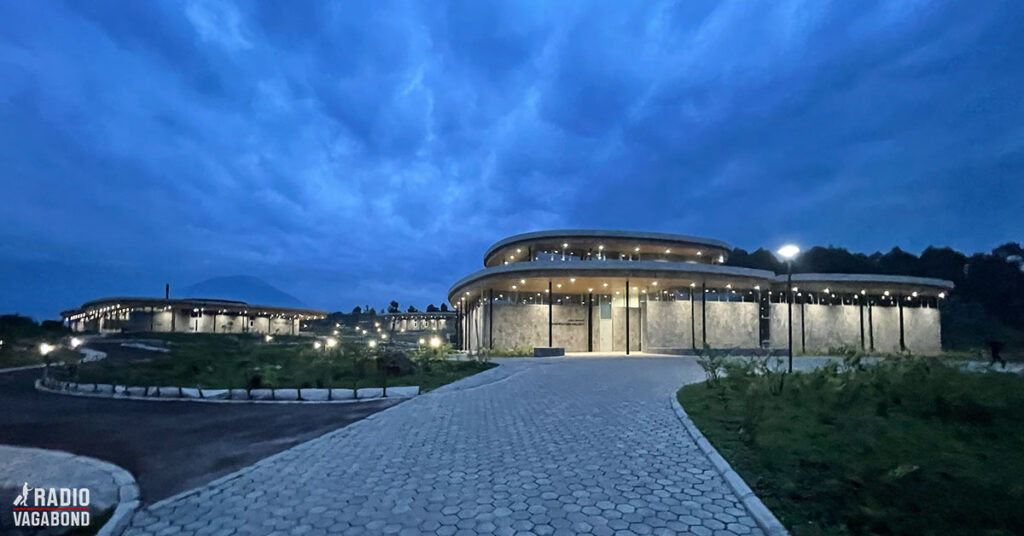
Our journey through Rwanda has been a testament to the country’s resilience, beauty, and hope. From the dark reflections at the Kigali Genocide Memorial to the awe-inspiring vistas of the Thousand Hills, Rwanda’s story is one of triumph over tragedy and the enduring spirit of its people.
As we depart, let us carry with us the lessons of remembrance, the appreciation for nature’s wonders, and the commitment to making a positive impact, echoing the sentiments of hope that resonate throughout this remarkable land. Rwanda invites us to remember, to marvel, and to aspire, leaving an indelible imprint on our hearts and minds.
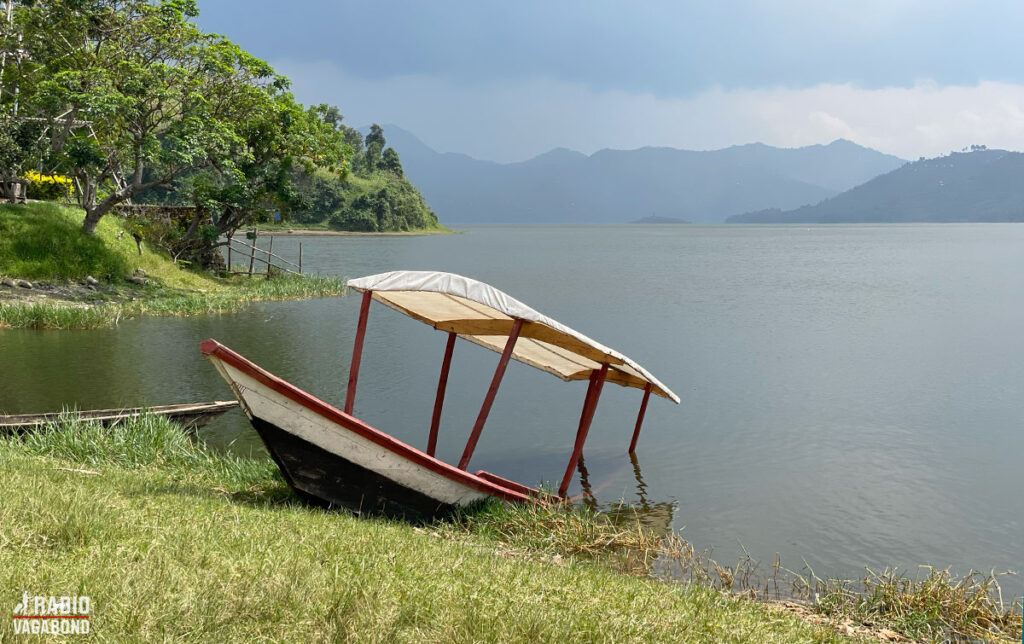
I WOULD LIKE TO HEAR FROM YOU!
Please tell me where are you and what are you doing as you listen to this episode? You can either send me an email on listener@theradiovagabond.com, go to TheRadioVagabond.com/Contact or send me a voice message by clicking on the banner.

Either way, I would love to hear from you. It’s so nice to know who’s on the other end of this.
SPONSOR
A special thank you to my sponsor, Hotels25.com, who always provide me with the best, most affordable accommodation wherever I am in the world.
Hotels25 scans for prices on the biggest and best travel sites (like Booking.com, Hotels.com, Agoda and Expedia) in seconds. It finds deals from across the web and put them in one place. Then you just compare your options for the same hotel, apartment, hostel or home and choose where you book.
When you book with Hotels25, you get access to 5,000,000 hotel deals. And it’s “best price guaranteed.”
PRODUCED BY RADIOGURU
The Radio Vagabond is produced by RadioGuru. Reach out if you need help with your podcast.

